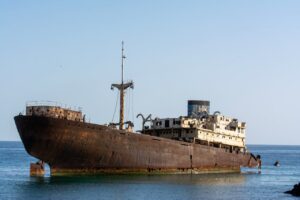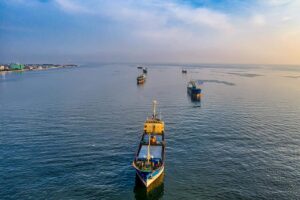The maritime industry faces constant challenges in ensuring vessel safety and environmental protection. The recent cargo ship grounding incident involving the Guyana-flagged vessel Hein near Trinidad and Tobago waters demonstrates the critical importance of coordinated emergency response protocols and environmental safeguarding measures.
On June 10, 2025, the cargo vessel Hein (IMO 6702284) experienced a significant maritime emergency when cargo shift caused severe listing, forcing the crew to deliberately ground the vessel near Monos Island in Chaguaramas waters. This cargo ship grounding incident triggered immediate environmental response measures and highlighted the effectiveness of modern maritime emergency management systems.

Vessel Particulars and Operational Details
The Hein represents a typical mid-sized cargo vessel operating in Caribbean waters. Built in 1966, this 61.75-meter vessel with a gross tonnage of 861 was carrying a full load of construction bricks destined for Saint Vincent and the Grenadines when the incident occurred.
The vessel’s technical specifications reveal key factors that influenced the emergency response. The cargo ship grounding incident was precipitated by adverse weather conditions that caused the brick cargo to shift dramatically, creating a dangerous port list that threatened vessel stability and crew safety.
Maritime authorities immediately recognized the severity of the situation. The vessel’s age and cargo type presented unique challenges for salvage operations, requiring specialized equipment and expertise to prevent total loss and environmental contamination.
Cargo Shift Dynamics and Ship Stability Concerns
Ship stability cargo shift incidents represent one of the most dangerous scenarios in maritime operations. The Hein’s cargo of bricks, while seemingly stable, demonstrated how improper securing or extreme weather conditions can create catastrophic stability issues.
The physics of cargo shift involves complex calculations of metacentric height, center of gravity, and free surface effect. When the brick cargo shifted to port, it fundamentally altered the vessel’s stability characteristics, creating a dangerous situation that required immediate corrective action.
Maritime safety protocols dictate that when vessel stability is compromised beyond recovery, controlled grounding represents the safest option. The captain’s decision to deliberately ground the vessel near shore demonstrated proper emergency seamanship and prevented a potential total loss scenario.

Environmental Response and Hydrocarbon Spill Containment
The cargo ship grounding incident immediately triggered environmental concerns when minor hydrocarbon leakage was detected. The spill consisted primarily of bilge water mixed with light oil, creating an environmental hazard that required immediate containment measures.
Fishermen and Friends of the Sea (FFOS) organization played a crucial role in early detection and advocacy for environmental protection. Their rapid response and demand for National Oil Spill Contingency Plan activation demonstrated the importance of civil society organizations in environmental monitoring.
Hydrocarbon spill containment operations involved deploying absorbent barriers around the grounded vessel. These specialized marine pollution control devices prevent hydrocarbon spread while allowing water circulation, minimizing ecological impact in the sensitive Chaguaramas marine environment.
Marine Salvage Operations and Technical Challenges
The salvage response to this cargo ship grounding incident involved sophisticated marine salvage operations coordinated by Captain Ronald Wilde and his specialized team. The deployment of the tugboat C Prowler and crane-equipped barge represented standard industry practice for vessel recovery operations.
Marine salvage operations require careful assessment of vessel condition, environmental factors, and cargo characteristics. The Hein’s intact hull condition provided salvage teams with favorable working conditions, allowing for systematic cargo removal and vessel stabilization procedures.
Technical challenges included managing the shifted cargo load while maintaining vessel stability during salvage operations. The brick cargo’s weight distribution required precise planning to prevent further listing during the recovery process.
Regulatory Framework and Authority Coordination
The cargo ship grounding incident demonstrated effective coordination between multiple regulatory agencies including the Environmental Management Authority (EMA), Institute of Marine Affairs (IMA), and Trinidad and Tobago Coast Guard. This multi-agency approach ensures comprehensive response coverage for maritime emergencies.
Maritime environmental protection regulations require immediate notification and response to any vessel incident with potential environmental impact. The Hein incident triggered these protocols, resulting in rapid deployment of specialized equipment and personnel to the incident site.
International maritime conventions, including MARPOL and SOLAS, provide the regulatory framework governing emergency response procedures. These conventions mandate specific environmental protection measures and reporting requirements for cargo ship grounding incidents.
Environmental Impact Assessment and Monitoring
Environmental response teams conducted comprehensive impact assessments following the initial hydrocarbon spill containment efforts. Water quality monitoring, marine life observation, and shoreline inspection protocols were implemented to evaluate potential ecological damage.
The limited environmental impact from this cargo ship grounding incident reflects the effectiveness of rapid response measures and favorable weather conditions. The contained nature of the hydrocarbon release prevented significant contamination of the sensitive Chaguaramas marine ecosystem.
Long-term environmental monitoring continues to assess any delayed impacts from the incident. Marine environmental protection requires sustained observation to identify potential ecosystem disruption that may not be immediately apparent.
Lessons Learned and Industry Best Practices
The Hein incident provides valuable insights into cargo ship grounding incident management and environmental response protocols. The coordinated response between government agencies, private salvage operators, and environmental organizations demonstrates effective emergency management practices.
Key lessons include the importance of rapid environmental assessment, immediate containment measures, and coordinated multi-agency response. The incident also highlights the critical role of vessel traffic monitoring and weather routing in preventing similar occurrences.
Industry best practices emerging from this incident emphasize enhanced cargo securing procedures, improved weather routing protocols, and strengthened environmental response capabilities. These measures contribute to overall maritime safety and environmental protection standards.
Future Implications for Maritime Safety
This cargo ship grounding incident reinforces the need for continuous improvement in maritime safety and environmental protection systems. The successful response demonstrates that well-coordinated emergency protocols can minimize both vessel loss and environmental damage.
Technological advances in vessel monitoring, cargo securing systems, and environmental response equipment continue to enhance the maritime industry’s ability to prevent and respond to similar incidents. Investment in these technologies represents crucial infrastructure for sustainable maritime operations.
The incident also underscores the importance of regular training and coordination exercises between response agencies. Effective emergency management requires practiced coordination between multiple stakeholders with diverse expertise and responsibilities.
Conclusion
The cargo ship grounding incident involving the vessel Hein near Trinidad and Tobago waters demonstrates the critical importance of coordinated emergency response and environmental protection measures in maritime operations. The successful containment of environmental damage and effective salvage operations reflect well-established protocols and professional expertise.
The incident serves as a reminder that maritime emergencies require rapid, coordinated response from multiple agencies and organizations. The combination of regulatory oversight, private sector expertise, and community advocacy created an effective response framework that minimized both vessel loss and environmental impact.
As the maritime industry continues to evolve, incidents like the Hein grounding provide valuable learning opportunities for improving safety protocols, environmental protection measures, and emergency response capabilities. These lessons contribute to the ongoing development of safer, more sustainable maritime transportation systems.
Ensure Your Vessel’s Safety and Compliance with QRS Class
Maritime incidents like the Hein grounding highlight the critical importance of proper vessel classification, certification, and technical oversight. QRS Class offers comprehensive services to ensure your vessel meets the highest safety and environmental standards.
Our Ship Classification services provide thorough assessment of vessels in operation, construction materials, and onboard systems. We perform essential Statutory Certifications including technical reviews and surveys for international convention compliance. Our Development of Technical Documentation services guide hull strength analysis, stability calculations, and damage assessments. Additionally, our Approval of Materials, Products and Processes ensures technical supervision and certification recognition.
Don’t wait for an emergency to discover compliance gaps. Contact QRS Class today to protect your vessel, crew, and the marine environment through professional classification and certification services.
References:
- SAFETY4SEA – [General cargo vessel lists off Trinidad and Tobago](https://safety4sea.com/general-cargo-vessel-lists-off-trinidad-and-tobago/)
- Trinidad Guardian – [Grounded cargo vessel off Monos Island leaking hydrocarbons, says FFOS](http://www.guardian.co.tt/news/grounded-cargo-vessel-off-monos-island-leaking-hydrocarbons-says-ffos-6.2.2329548.3db0cddca5)
- St. Vincent Times – [Cargo ship runs aground while en route to SVG](https://www.stvincenttimes.com/guyana-cargo-ship-run-aground-trinidad-enroute-to-st-vincent/)
- Newsday (TT) – [Efforts continue to stabilise sinking Guyana ship](https://newsday.co.tt/2025/06/12/efforts-continue-to-stabilise-sinking-guyana-ship/)
- AZP News – [Grounded Cargo Vessel being Off Loaded](https://azpnews.com/grounded-cargo-vessel-being-off-loaded/)




